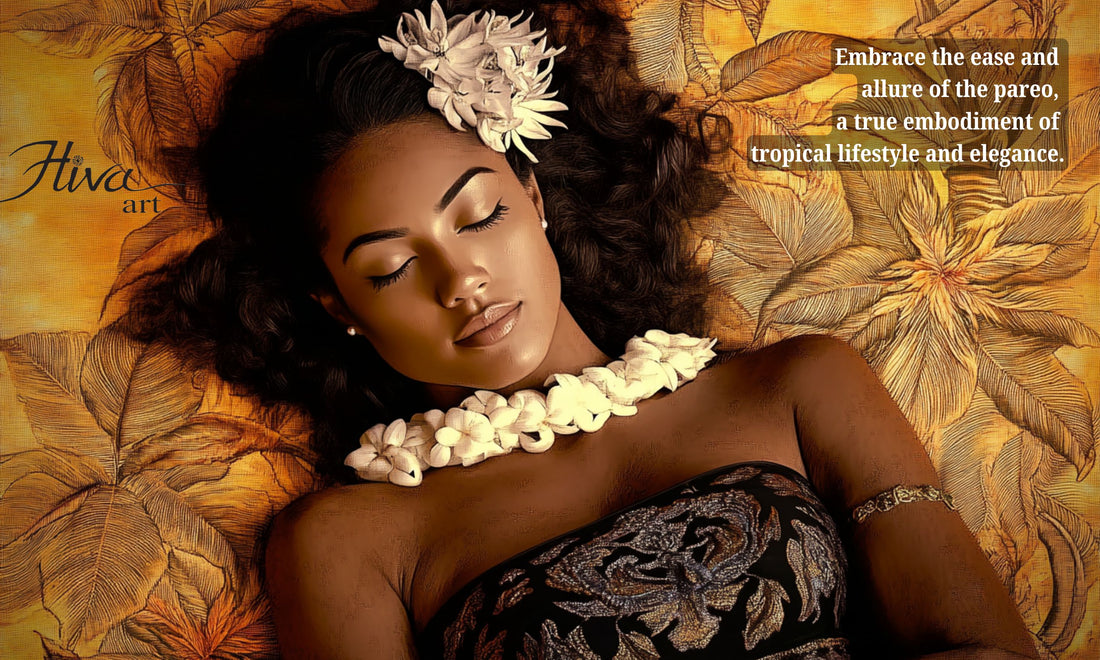
The Pareo: A Versatile Piece of Clothing and Cultural Icon
Share
The pareo, a traditional garment rooted in Polynesian culture, is much more than just a piece of fabric—it's a symbol of lifestyle, versatility, and heritage. Whether worn on sun-soaked beaches or in bustling markets, the pareo embodies both functional fashion and a deep connection to a way of life that prioritizes comfort, nature, and community. In this blog post, we'll explore the versatility of the pareo and its rich cultural significance, making it a must-have item for any wardrobe.
What is a Pareo?
The pareo, also known as a sarong in other parts of the world, is a large piece of fabric that can be wrapped around the body in various ways. Traditionally worn in Polynesia, it is often made from lightweight cotton or silk, featuring bright, colorful patterns inspired by nature—floral prints, ocean motifs, or geometric designs. Though the pareo has evolved in style and use over time, its essence remains tied to the cultural values of simplicity, beauty, and adaptability.

A World of Versatility
One of the pareo's greatest strengths is its versatility. With just one piece of fabric, you can create numerous looks and uses, making it the perfect companion for travelers, beachgoers, and fashion enthusiasts alike. Here are a few ways to style a pareo:
This adaptability makes the pareo more than just a fashion accessory—it's a piece of practical, wearable art that seamlessly transitions from one function to another depending on your needs.
Embodiment of Cultural Lifestyle
For the Polynesian people, the pareo is more than just a versatile garment; it is woven into the fabric of their cultural identity. Traditionally, the designs and patterns on a pareo reflect local stories, nature, and spirituality. Wearing one is not only a personal fashion choice but a connection to heritage.
In places like Tahiti, Fiji, and Hawaii, the pareo is a garment that signifies a laid-back, island lifestyle. It reflects the simplicity and beauty of life close to nature, where form and function blend harmoniously. The act of tying and wearing a pareo also embodies a sense of community and tradition, passed down through generations.
Whether you’re lounging on the sand or attending a special cultural event, the way a pareo is tied and worn can signify different meanings—from casual beachwear to more formal, ceremonial attire. It’s a reflection of how the Polynesian people use what they have—often limited by their island surroundings—to create something that’s not only practical but deeply meaningful.
A Modern Cultural Symbol
Today, pareos are popular worldwide, embraced not only for their practicality but for the cultural richness they carry. They serve as a way to promote sustainable fashion, offering a minimalist wardrobe staple that can replace multiple other clothing items. In high-end resorts and beach towns, pareos have become synonymous with luxury, blending comfort and sophistication effortlessly.
Beyond fashion, the pareo also symbolizes the importance of preserving cultural traditions. As the world becomes more interconnected, the use of pareos in global fashion serves as a bridge between modern trends and ancient practices. By wearing a pareo, you aren’t just embracing its functionality—you’re also celebrating a lifestyle that values balance, respect for nature, and appreciation for artistic expression.
The pareo is much more than just a piece of fabric. It is an embodiment of cultural heritage, artistic expression, and functional fashion. Its versatility allows it to be worn in countless ways, adapting to the needs of the wearer while always maintaining its connection to Polynesian roots. Whether you're exploring a tropical paradise, attending a beach wedding, or simply looking to add a bit of culture and style to your wardrobe, the pareo is a timeless garment that will never go out of fashion.
So the next time you wear a pareo, remember that you're not just wrapping yourself in a beautiful fabric—you're embracing a cultural lifestyle that celebrates simplicity, creativity, and a deep connection to the natural world.
